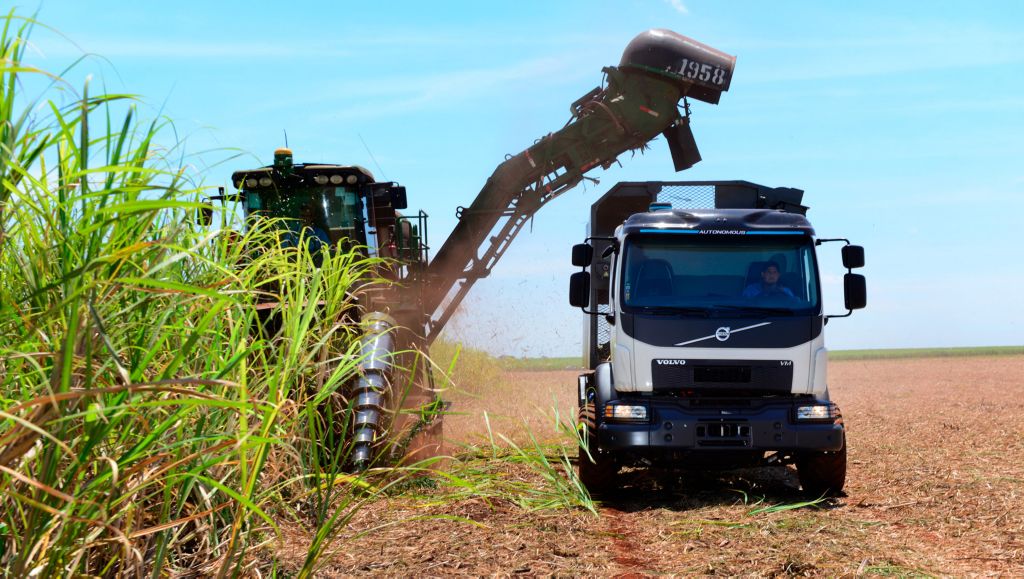Self-steering Volvo truck set to increase Brazil’s sugar-cane harvest


In Maringá, an hour’s flight west of São Paulo, the Usina Santa Terezinha Group produces sugar and ethanol from its own sugar-cane crops. In the past growing season, the company’s huge fields have served as a test area for a prototype vehicle from Volvo Trucks. The truck was developed to examine how automated driving can make it possible to avoid damage to soil and crops, thus boosting revenues. The potential for bigger harvests is significant – up to ten tonnes per hectare per year.
“With the help of Volvo Trucks’ solution we can increase productivity, not just for one single crop but for the entire lifecycle of the sugar-cane plant, which lasts five to six years,” explains Santa Terezinha’s Finance and Procurement Director, Paulo Meneguetti.
At present, sugar-cane is brought in from the fields using harvesters and manually controlled trucks, which drive alongside each other at a low speed. When a truck is fully loaded and drives off to empty its load, the next one moves up next to the harvester and the procedure is repeated. The big challenge for the truck driver is to match the speed of the harvester and at the same time concentrate fully on driving in its tracks, so as not to trample the nearby plants that will become the following year’s crop.
Volvo Trucks has solved the problem with a driver assistance system that automates steering. It ensures that the truck always maintains exactly the right course when it drives to, alongside and away from the harvester, so that the plants are not damaged by trampling.
With the help of GPS receivers, the truck follows a coordinate-based map across the sugar-cane field. Two gyroscopes ensure that not only the front wheels but the entire vehicle is steered with great precision, to prevent the truck from veering more than 25 mm laterally from its set course. When loading, the driver can choose to regulate speed with the help of the vehicle’s cruise control, or to accelerate and brake manually. Since the driver is released from the burden of the concentration-demanding and tiring high precision steering process, it is easier to remain focused and work in a more relaxed and safe way throughout the shift.
“With this solution we will soon be able to significantly increase the productivity of our customers in the sugar-cane industry. At the same time, we will improve their drivers’ working conditions and safety. This in turn will make the job more appealing, and make it easier to recruit and maintain drivers,” says Wilson Lirmann, President of Volvo Group Latin America.
This summer the research project will transition into the product development phase, with more vehicles being field-tested. After that, the solution can be expected to become commercially available in the foreseeable future. Already this year Volvo Trucks will offer its customers an advanced GPS-based map-reading system that gives the driver far better scope for maintaining a predetermined course, even though actual steering will still be handled manually at this stage.
The self-steering truck being used for sugar-cane transport is one of Volvo Trucks’ research and development projects for automated vehicles. Tests are currently under way on an autonomous truck for mining operations in the Kristineberg Mine in northern Sweden, and an autonomous refuse collection truck is being tested in Gothenburg, Sweden. The aim is to evaluate how systems with different degrees of automation can contribute to higher productivity, a better working environment, and improved safety.
2017-06-08
Journalists who would like further information, please contact:
Fredrik Klevenfeldt
Director Public Relations and Social Media
Volvo Trucks
Tel: +46 31 322 1106; email: fredrik.klevenfeldt@volvo.com
Link to the film: https://www.youtube.com/watch?v=uOpjtz0Hluo&feature=youtu.be
For more information visit Volvo Trucks: http://www.volvotrucks.com/en-en/home.html
For more stories from the Volvo Group, please visit www.volvogroup.com/press.
The Volvo Group is one of the world’s leading manufacturers of trucks, buses, construction equipment and marine and industrial engines. The Group also provides complete solutions for financing and service. The Volvo Group, which employs about 95,000 people, has production facilities in 18 countries and sells its products in more than 190 markets. In 2016 the Volvo Group’s sales amounted to about SEK 302 billion (EUR 31,9 billion). The Volvo Group is a publicly-held company headquartered in Göteborg, Sweden. Volvo shares are listed on Nasdaq Stockholm. For more information, please visit www.volvogroup.com.